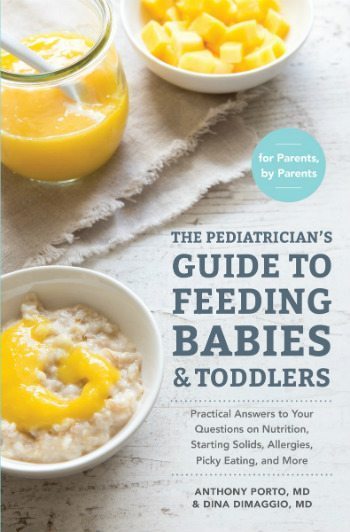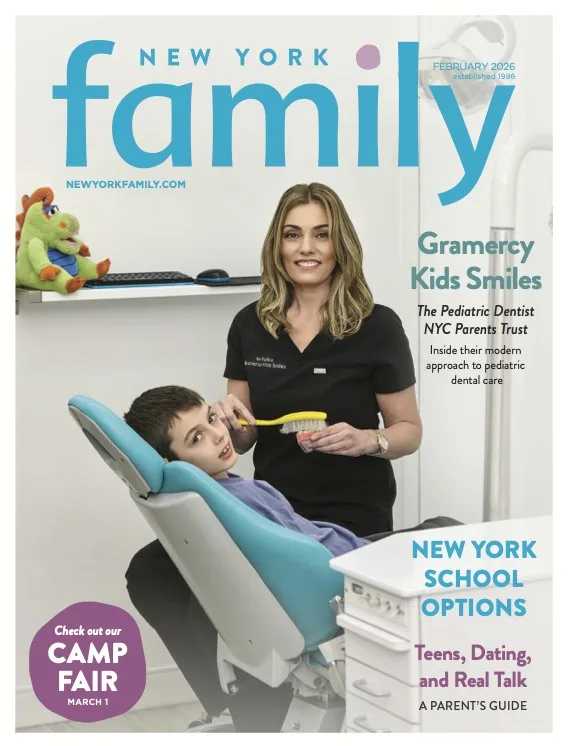 There are certain books that a new mom keeps by her bedside for those late-night quick references. The Pediatrician’s Guide to Feeding Babies & Toddlers is one of them. Written by a group of pediatricians and pediatric sub-specialists who also happen to be parents, the book combines the reality of parenthood with medical acumen. Sprinkled with real-life parenting stories, it serves as a practical guidebook on feeding babies and toddlers, with an endearing personal touch.
There are certain books that a new mom keeps by her bedside for those late-night quick references. The Pediatrician’s Guide to Feeding Babies & Toddlers is one of them. Written by a group of pediatricians and pediatric sub-specialists who also happen to be parents, the book combines the reality of parenthood with medical acumen. Sprinkled with real-life parenting stories, it serves as a practical guidebook on feeding babies and toddlers, with an endearing personal touch.
With an easy-to-read Q&A format, the book is divided into five age groups from the newborn phase to the early toddler years. It is gratifying for an exhausted mother to get pediatrician-approved advice on nutrition, baby food preparation, and food allergies in such a simple, yet comprehensive manner.
We spoke to the lead authors—Anthony Porto, MD MPH and Dina Dimaggio, MD—about breastfeeding, picky eaters, and the rising popularity of organic produce. Below are answers from Porto and Dimaggio , as well as facts gleaned from the book itself, on a variety of topics.
Breastfeeding is portrayed in the media as a beautiful bonding experience between a mother and her newborn. In many cases, that’s true. But there are a lot of moms who struggle physically and emotionally—sore nipples, improper baby latching, and the constant guilt of one’s child being formula-fed. How would you encourage moms in this difficult scenario?
Dimaggio: The American Academy of Pediatrics (AAP) recommends babies being exclusively breastfed for the first six months. However, when a new mom has trouble breastfeeding, we strongly recommend reaching out to a lactation consultant. There are a lot of ways you can troubleshoot breastfeeding problems with professional help. We ask mothers to always do what’s best for her baby. Breastfeeding or formula feeding—it doesn’t matter. We do the best we can to support mothers, irrespective of their breastfeeding abilities and the circumstances surrounding it. We want a mother to enjoy her baby more than anything else.
There is considerable debate on when an infant can start solid foods. What do you recommend?
Dimaggio: We recommend introducing complementary feeding to infants no earlier than 17 weeks, and no later than 26 weeks of age.
Porto: Babies can start solids when they are developmentally ready, typically between four and six months. “Developmentally ready” would mean that the baby has good head control and is able to sit up without support, and has diminished extrusion reflex [which is a reflex, in which a baby pushes food out of his/her mouth instead of swallowing].
Can spices be introduced to an infant’s meal?
Dimaggio: Yes, Absolutely. Breastfed babies “taste” different flavors and spices in a mother’s breast milk depending on her diet. To start out, you can include some common spices like cinnamon and vanilla.
Porto: Other than salt and added sugar [it is best to limit the amount of salt in your child’s diet, as it may reduce the risk of high blood pressure and other diseases as he or she ages], feel free to introduce a variety of spices as it conforms to your family’s diet.
In the last few years, we are reading a lot about the benefits of organic produce. Do you feel the added expense is worth it?
Dimaggio: Yes, organic produce is more expensive. However, we would rather you eat more fruits and vegetables than not eat them at all (to avoid higher costs). We suggest washing them as thoroughly as you can.
Porto: We also recommend that you avoid buying foods from the Environmental Working Group’s (EWG) “Dirty Dozen” [The EWG’s 2016 dirty dozen list includes: strawberries, apples, nectarines, peaches, celery, grapes, cherries, spinach, tomatoes, sweet bell peppers, cherry tomatoes and cucumbers] list of foods that contain the highest pesticide ratio.
[gravityform id=”15″ title=”false” description=”false” ajax=”true”]
Do you have any tips for parents with picky eaters?
Dimaggio: I think the first and foremost advice we can give, is to not stress about it. We want to work with our children, and not against them. Some picky eater tips we recommend: make feeding fun and interesting with cookie cutters and dipping sauces, have your kids go food shopping with you and introduce bite-sized food portions with young children to support independent eating.
Porto: There are some days when a child won’t eat at all, and that’s ok. It is more important to study the pattern of their eating habits. It is also vital to eat as a family together while minimizing distractions at mealtimes such as television and tablets.
Is it safe to give any of the popular milks to toddlers – almond milk, coconut milk, rice milk etc.?
Porto: We recommend only breast milk or formula for babies for the first twelve months. Almond milk is a popular choice, however this has very little protein (compared to whole milk). We recommend that you choose an alternative, which is rich in protein like hemp milk and oat milk.
The book states: “Food allergies affect one in thirteen children.” What tips do you have for parents who struggle with their little ones’ food allergies?
Dimaggio: For mild allergic reactions like hives, you can give your child an appropriate dosage (under your pediatrician’s guidance) of Benadryl. For severe allergic reactions like wheezing and vomiting, you should give your child EpiPen (Epinephrine) right away.
Porto: It is very important that you speak to your pediatrician about your child’s food allergies. We strongly recommend that your child be seen and evaluated by a pediatric allergist, as tests in the market are not really validated. Also, if your child is allergic to more than one thing, then visit a dietician to make sure he or she is getting the necessary calories.
To learn more about the book’s authors, visit pediatriciansguide.com!













